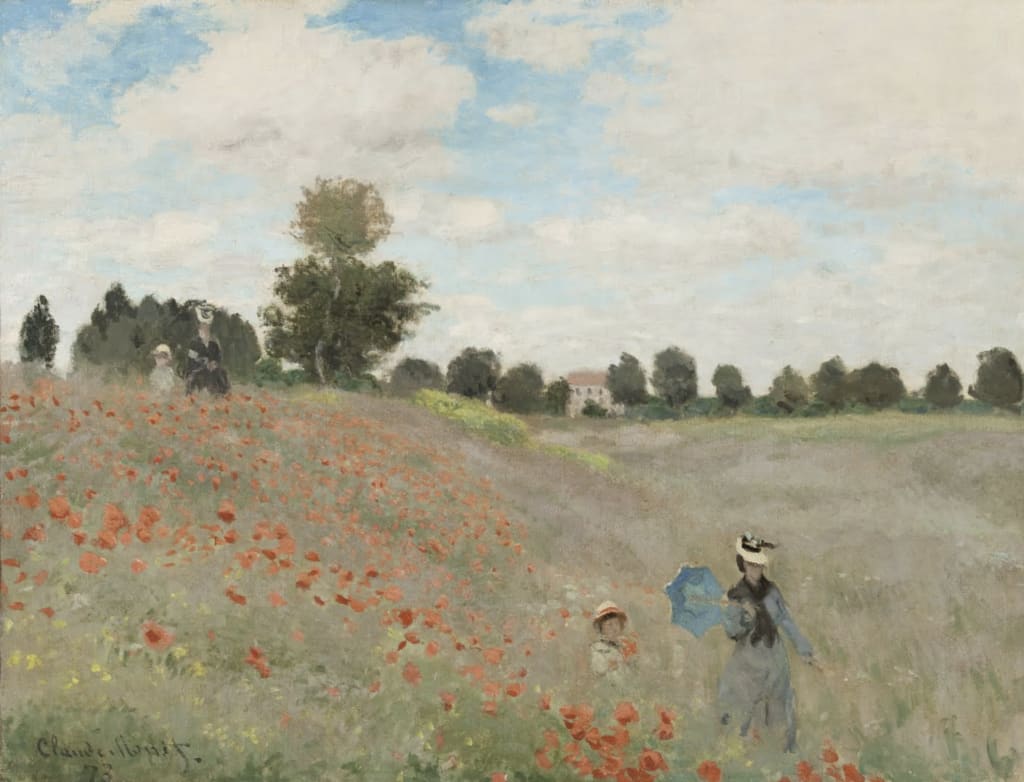Hundreds of Fields, Hundreds of Canvases
In Which Olivia de Bastian Seeks an Escape

Paris. 1874.
Olivia sits in a field, before a canvas. She has sat in hundreds of fields, before hundreds of canvases, over a period of hundreds of years. By now, the brushstrokes come as easily as breathing: the force of three centuries of habit. But never before has she tried to keep the motions so loose; to lay on the paint so thick and ridged. Never has she aimed to capture the view as her eye sees it, nakedly and without interpretation—in blocks of color and in fleeting impressions of movement.
Impressionism, the critics called it, when they derided the new exhibition, the one that Monet and Pissarro and the rest of them put on. Olivia went to see it yesterday and she has to agree with the newspapers. She finds the whole movement a bit mushy. Where is the discipline if you can throw colors around willy-nilly? Where is the artistry that realism requires?
But she has mastered realism. Her paintings hang in museums and collections under a dozen different men’s names. Michelangelo was the first one, and then Caravaggio, then Watteau and Géricault and on and on. No matter how many cities she visits, no matter how many lovers she dallies with, no matter how many new continents she sails to, she can’t recapture the thrill of painting anymore. Perhaps this Impressionism, loosed from the bounds of realism, will loose her from her apathy.
She is Olivia right now, her true self, not any of her alter-egos (many of whom the wider world thinks died young). And so even though she wears trousers, she has left her chest unbound and her hair loose. Occasionally, when she goes out as a woman, she misses the tight squeeze of the bandages she uses to flatten her chest. They cut into her armpits but make her feel safe. She imagines babies must feel the same way when their mothers swaddle them tight: that the discomfort, so similar to the constriction of the womb, feels like home.
As Olivia mixes her paints, she tries very hard to ignore the loneliness that pinches her above her breastbone. This, too, is a familiar pain, one that she cannot remember a time without, although she knows, logically, that she used to be free of it. She had a family in the hazy time that was her childhood, before Da Vinci’s damned immortality concoction, before she lost the ability to age. Today, the ever-present loneliness manifests as the pain of having left someone, again. It is the pain of her latest lover weeping, even though Olivia thought she had made it clear from the beginning that she would not dally with her long.
If only Olivia could have lingered with Johanna a little longer. Johanna had the most beautiful face, round and freckled, and her expressions opened up into the biggest, most joyous smiles.
But Olivia has learned the hard way—and what a hard way it was—that she cannot stay in the same place for more than ten years or so, fifteen at the most. People begin to ask questions, they begin to call doctors, they begin to call priests. When she lives as a man, she can spend less time in the same place, for she has to play at being younger than she is, and companions expect her voice to deepen and her beard to come in; and they suspect foul play when these things never happen. Olivia-as-Olivia, on the other hand, gets a bit more time, because who desires that a woman age? If she stays fresh-faced and young for longer than her peers, it is only a testament to her beauty, at least at first. Eventually, even the strange ward of femininity cannot save her.
They tried to burn Olivia-as-Olivia in America, once, after they realized she didn’t age. When the fire didn’t take, they threw her in a pond, with a millstone around her neck, and she couldn’t undo the knots. Then they forgot about her. And she had to stay down there, watching algae turn furry below and ice advance and retreat overhead, until a sharp rock tumbled within reach and she could fray away the rope. She’d been ravenously hungry the whole time, so hungry she thought she might die, but emerged from the pond exactly the same as always: no lesser in weight, no thinner in the arms or the ribs.
That is her real curse, she thinks, as she dashes paint onto her canvas: stagnation. She has lived a patchwork life, moving every decade, speaking French and English and Italian, but she herself never changes. Even the languages metamorphose—vowels fit differently in her mouth, and words catch on and die out as suddenly as flames. But Olivia just … persists. Requiring neither air nor water nor food, as if she is not impossibly alive, but already dead.
She squints at the field, fuzzing it to base colors between her eyelashes. Then she inspects her handiwork on her canvas. She is, it seems, not particularly good at this Impressionism technique. She is too fond of details and line-work.
Perhaps the issue is that there is no joy in it. That is her never-ending problem. This whole time, she has been thinking about everything except the canvas and its fleeting reflection about the field before her eyes. She has been maudlin. She has been caught in the impossible stretch of the past.
She would kill Da Vinci, if he were not already centuries dead, afforded a privilege he took from her. He always did hate her, seeing her as an unqualified upstart twenty years his junior, but she did not realize the true contempt with which he regarded her until it was too late. Ever since that day when Da Vinci broke the ambrosia of immortality over her—not a blessing but a curse, foolishly intended to keep her from ever catching up with him—everything has been the same. The joy has drained steadily from painting. No one alive knows more than Olivia about oil paints, about brushes, about canvas, and so the glorious spark of learning has dulled. Even the intermittent geniuses—these Impressionists, perhaps—cannot make the great love of her life feel fresh after three hundred years.
But she cannot stop painting any more than she can stop living. To do so would be to admit to despair. To giving up. And Olivia is not allowed to give up. Whatever she does or does not do, her body will go on without her. She can lay down in the field right now, and hold her breath and refuse to move a muscle, and force herself to go hungry and thirsty and airless, and all that will happen is that dirt and grass will cover her and flowers will sprout in her hair and the occasional wild creature will rest in the hollow of her side. Her mind, as ever, will churn on.
And so, she paints. She paints because her family is gone and her lovers are gone and Johanna, now, is gone; and there is nothing else for her to do.
About the Creator
Emma Gardner
Emma Gardner is a classics grad student, an aspiring writer, and a BookToker (@theaceofbooks). She reads 200 books a year.
Enjoyed the story? Support the Creator.
Subscribe for free to receive all their stories in your feed. You could also pledge your support or give them a one-off tip, letting them know you appreciate their work.







Comments (1)
Fascinating concept. Well done.